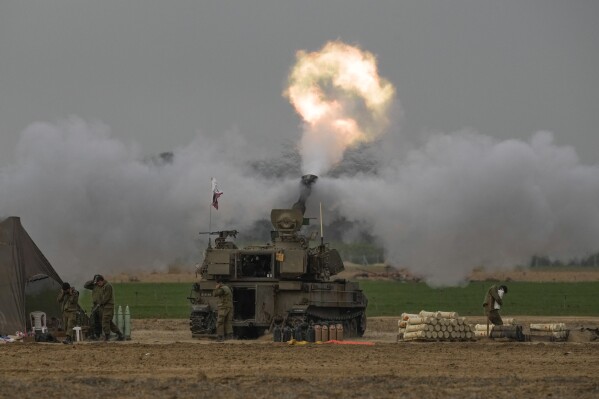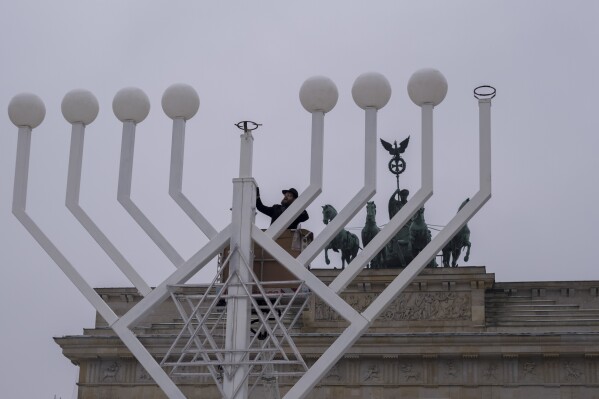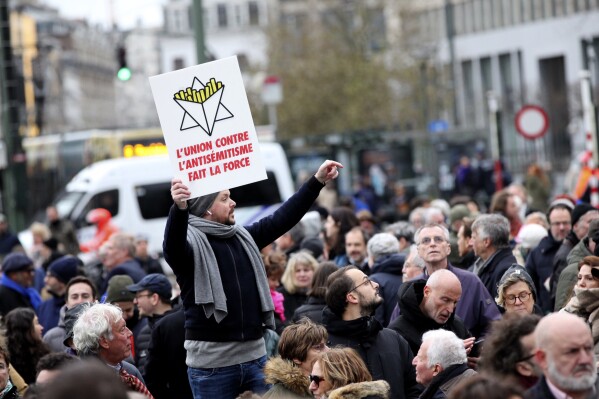Israel battles militants in Gaza’s main cities, with civilians still stranded near front lines
RAFAH, Gaza Strip (AP) — Israeli forces battled Palestinian militants in Gaza’s two largest cities on Monday, with civilians still sheltering along the front lines even after massive waves of displacement across the besieged territory.
Israel has pledged to keep fighting until it removes Hamas from power, dismantles its military capabilities and returns all of the scores of hostages still held by Palestinian militants after being captured during the Oct. 7 surprise attack into Israel that ignited the war.
The U.S. has provided unwavering diplomatic and military support for the campaign, even as it has urged Israel to minimize civilian casualties and further mass displacement. The war has killed thousands of Palestinian civilians and driven nearly 85% of the territory’s 2.3 million people from their homes.
Residents said there was heavy fighting in and around the southern city of Khan Younis, where Israeli ground forces opened a new line of attack last week, and battles were still underway in parts of Gaza City and the built-up Jabaliya refugee camp in northern Gaza, where large areas have been reduced to rubble.
 Live updates | Israel says it’s prepared to fight for months to defeat Hamas
Live updates | Israel says it’s prepared to fight for months to defeat Hamas
 Holocaust survivors will mark Hanukkah amid worries over war in Israel, global rise of antisemitism
Holocaust survivors will mark Hanukkah amid worries over war in Israel, global rise of antisemitism
 Thousands march in Europe in the latest rallies against antisemitism stoked by the war in Gaza
Thousands march in Europe in the latest rallies against antisemitism stoked by the war in Gaza
“The situation is extremely difficult,” said Hussein al-Sayyed, who is staying with relatives in Khan Younis after fleeing Gaza City earlier in the war. “I have children and I don’t know where to go. No place is safe.”
He and his three daughters are staying in a three-story home with around 70 others, most of whom have fled from the north, and said they have been rationing food for days. “Over many days, I have eaten just one meal a day to save food for the girls. They are still young,” he said.
Another Khan Younis resident, Radwa Abu Frayeh, witnessed heavy Israeli strikes around the European Hospital, where the U.N. humanitarian office says tens of thousands of people have sought shelter. She said a strike hit a home close to hers late Sunday.
“The building shook,” she said. “We thought it was the end and we would die.”
FEARS OF PERMANENT DISPLACEMENT
With very little aid allowed in, Palestinians face severe shortages of food, water and other basic goods. Some observers openly worry that Palestinians will be forced out of Gaza altogether in a repeat of the mass exodus from what is now Israel during the 1948 war surrounding its creation.
“Expect public order to completely break down soon, and an even worse situation could unfold including epidemic diseases and increased pressure for mass displacement into Egypt,” U.N. Secretary-General Antonio Guterres told a forum in Qatar, a key intermediary, on Sunday.
Eylon Levy, an Israeli government spokesman, called allegations that Israeli intends mass displacement from Gaza “outrageous and false.” But other Israeli officials have discussed such a scenario, raising alarm in Egypt and other friendly Arab countries that refuse to accept any refugees.
At the same time, it’s not clear when or if Palestinians would be allowed to return to Gaza City and much of the north — home to some 1.2 million before the war — where entire neighborhoods have been flattened.
The fighting in and around Khan Younis threatens to bring similar destruction to the south, and has already pushed tens of thousands toward the town of Rafah and other areas along the border with Egypt. It has also hindered the delivery of humanitarian aid to most of Gaza, putting even more pressure on people to head south.
HARSH CONDITIONS IN THE SOUTH
Israel says it tries to avoid harming civilians and blames their deaths on Hamas, saying it endangers residents by fighting in dense areas and positioning military infrastructure — including weapons, tunnels and rocket launchers — in or near civilian buildings.
The military said Sunday that troops killed armed men as they left a clinic, and that forces operating in Jabaliya found a truck full of long-range rockets near a school. In a home in Jabaliya, soldiers found a rifle, two rocket-propelled grenade launchers and explosives, it said.
Israel has urged people to flee to what it says are safe areas in the south but has continued to strike alleged militant targets throughout the territory. Associated Press reporters saw nine bodies brought to a local hospital on Monday after an airstrike hit a home in Rafah overnight.
The aid group Doctors Without Borders said people in the south are also falling ill as they pack into crowded shelters or sleep in tents in open areas.
Nicholas Papachrysostomou, MSF emergency coordinator in Gaza, said “every other patient” at a clinic in Rafah has a respiratory infection after prolonged exposure to cold and rain.
“In some shelters, 600 people share a single toilet. We are already seeing many cases of diarrhea. Often children are the worst affected,” he said.
With the war in its third month, the Palestinian death toll in Gaza has surpassed 17,900, the majority women and children, according to the Health Ministry in the Hamas-controlled territory. The ministry does not differentiate between civilian and combatant deaths.
Some 1,200 people have been killed on the Israeli side, mostly civilians killed during the Oct. 7 attack, in which Hamas and other militants also captured more than 240 people, including babies, women and older adults. More than 100 captives were released during a weeklong cease-fire late last month in exchanges for women and minors held in Israeli prisons.
Israel says Hamas still has 117 hostages and the remains of 20 people killed in captivity or during the Oct. 7 attack. Most remaining hostages are soldiers and civilian men, and the militants hope to exchange them for Palestinians imprisoned by Israel.
The military says 101 Israeli soldiers have died since the start of the Gaza ground offensive. Palestinian militants have continued firing rockets at Israel, though the vast majority have been intercepted or landed in open areas without causing casualties or damage.
___
Magdy reported from Cairo. Associated Press writer Tia Goldenberg in Tel Aviv, Israel contributed.
___
Full AP coverage at https://apnews.com/hub/israel-hamas-war
Disclaimer: The copyright of this article belongs to the original author. Reposting this article is solely for the purpose of information dissemination and does not constitute any investment advice. If there is any infringement, please contact us immediately. We will make corrections or deletions as necessary. Thank you.



